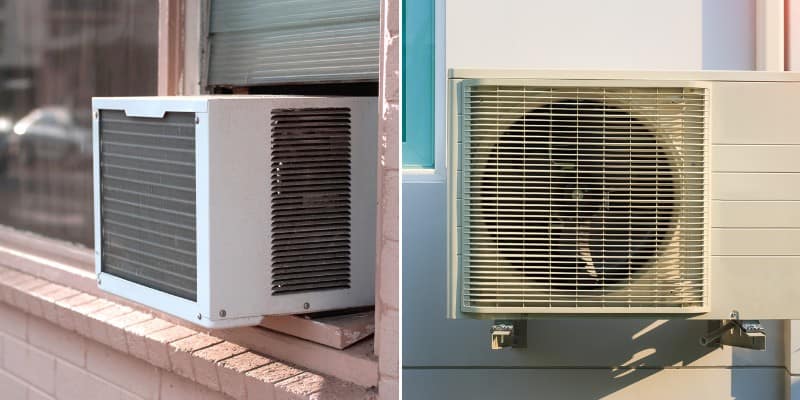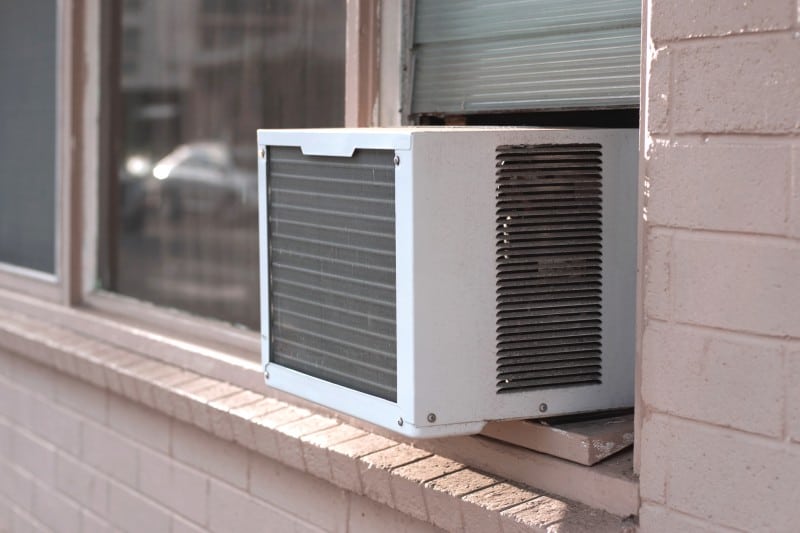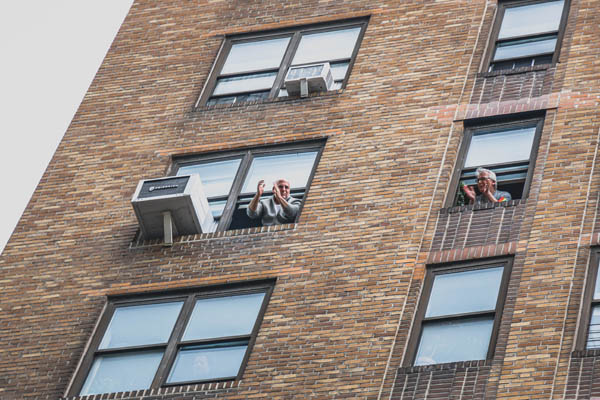Increasing energy bills are becoming a regular part of everyday life for many. For this reason, it is likely that you are looking for alternative sources and ways to get the maximum efficiency from your air conditioner system.

An average American household is believed to spend over $2,000 on their energy bills alone. Installing a window air conditioner is a cost-effective way of reducing the cost of these energy bills. In fact, a window air conditioner is believed to save you between 20-50% on your energy bills.
As the name suggests, a window air conditioner is of course installed in a window and works by cooling the interior air by blowing it over an evaporator. Essentially, a window air conditioner removes the unwanted air and humidity from inside your home.
They are typically designed with holes that drain the condensation water outdoors. A second fan then functions by blowing the air over the condenser.
Running a window air conditioning system can cost anything between $40 and $100 per year (on average).
Of course, this is a rather broad cost bracket, however, the total cost is going to be dependent upon the power of your system (measured in BTU) and its wattage.
You should expect those that function using less power with a lower wattage to cost less and those with more power and higher wattages to cost more on a yearly basis.
Many factors are going to affect the running cost of your window air conditioning system. Breaking down each of these is going to give you a clearer understanding as to how your system is going to affect your total energy bill.
The Systems Cooling Capacity
The cooling capacity of your window air conditioning system is going to affect the cost in some way. Essentially, the cooling capacity is the size of the area that the system can cool.
Those that have a higher cooling capacity are likely to be the more costly option as they use more energy. However, if you are working with a bigger area then this increased cost should be expected.
The Power Wattage and BTU Rating
Wattage used by a window air conditioning system can vary from 500 to 1400 watts. The wattage refers to the amount of electricity that is used when the system is functioning at its maximum capacity.
The BTU rating refers to the power that your window air conditioner uses. Those with a higher BTU rating, using a higher wattage of power, are going to correlate to higher prices.
Operating Temperature
The operating temperature of your window air conditioning system is going to influence the total costs and power that is used. This also depends on the climate conditions of the room that the window air conditioning system is going to be installed in.

If the room is naturally cool, then, of course, it is going to use less power than a room that is subject to regular and harsh sunlight resulting in warmer temperatures. This is because the system is going to have to work harder for the cooler air to circulate.
The Climate that you Live in
Aside from the heat itself, it is also important to consider the levels of humidity in the location where you live. If you are subject to a frequent amount of high humidity, your window air conditioning is going to have to work harder as a result.
The system is going to be using more power which is of course going to result in higher energy bills for you.
A solution to this issue is to ensure that you select the window air conditioning system that is going to be able to perform the most effectively in these conditions.
The Running Time
Your energy bills are going to be rather costly if your window air conditioner is running throughout the day and night regularly as it is using a constant source of power.
However, if you turn the system on at the times when it is required the most, your bills are less likely to be as costly.
The Energy Efficiency Rating
An appliance or system that is energy efficient simply uses a lower amount of energy to provide the same level of energy and power in return. The rating refers to your system’s capabilities of turning electricity into cool power.
A window air conditioner with a higher rating is going to be more energy-efficient.
These above factors are going to significantly influence the impact that your window air conditioning system has on your energy bills.
It isn’t possible to claim a specific monthly cost or a definitive amount in the reduction of your current energy bills, as the functioning of your system is influenced by a mixture of the above variable factors.
How can you reduce the costs of your window air conditioning system?
It is beneficial to consider additional ways to reduce your energy costs once you have invested in a window air conditioning system, there are several steps that you can take yourself. Ensure that you select the right size system for your needs.
As we have mentioned smaller window air conditioners with lower power wattages and BTU ratings are going to be cheaper to run, however, this is only likely to be effective if this is the correct size to suit the needs of the room that it is going to be used inside. Also, ensure that it only runs for the duration of time that it is required.
There may be occasions where you forget that it is running so it is operating for a long period, however, when possible try and switch your window air conditioner on and off when it is required as this isn’t going to result in such costly energy bills. Maintaining your window air conditioner can also be cost-effective.
Regularly cleaning or replacing the filters inside can help to conserve energy while also helping to lower energy costs as a result.
It is suggested that you change the filters of your window air conditioning system on a monthly basis as this is also to result in enhanced performance and efficiency.
Insulation can also be beneficial, in fact, window air conditioning systems that are used inside rooms that are efficiently sealed and insulated aren’t required to function as hard because the system isn’t contending with escaping air from the surroundings.
If your rooms are already insulated this isn’t likely to be an issue, however, this may be beneficial if you want to see a reduction in your energy bills.
Final Thoughts
A window air conditioning system is definitely a cost-effective solution to reducing your energy bills.
However, it is important to remember that they still use power, particularly those that are larger in size with a bigger wattage and cooling capacity so they can still be rather expensive, although this is likely to remain a reduction on your typical energy bills.
You may find a window air conditioning system to be the most cost-effective when used in one or two rooms throughout your home.
You will find many useful tools online such as cost calculators which enable you to gain an understanding of how much you are likely to be spending on your specific window air conditioning system.
Your annual energy costs can range depending on the factors that apply to your home and the climate conditions that your window air conditioning system is functioning in. For those using a smaller amount of power, you can expect your energy bills to be significantly lower.
It’s important to consider each of the variable factors and whether they apply to your home and the environment that you live in as you will then be able to purchase the best system for your needs, which is likely to see you benefit from reduced energy costs in no time.
Related Posts
- How to Stop Sliding Doors from Rattling – Causes and Solutions
- Cheap Ways to Heat a Room – Efficient and Budget-Friendly Solutions
- 11 Ways to Get Rid of Cooking Smells in a Small Apartment or House
- 11 Stores and Sites Like IKEA For Affordable Furniture and Home Products
- All About Polypropylene – Olefin Fabric Sofa Material
- 12 Different Types of Wood for Outdoor Furniture with Pros/Cons

Leave a Reply